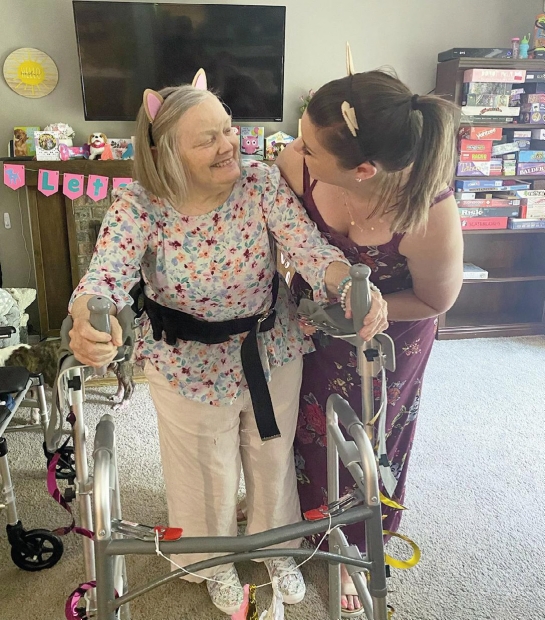WHAT'S HAPPENING
NAVIGATING AGING: A NEW MEDICARE PROPOSAL WOULD COVER TRAINING FOR FAMILY CAREGIVERS
BY JUDITH GRAHAM
Even with extensive caregiving experience, Patti LaFleur was unprepared for the crisis that hit in April 2021, when her mother, Linda LaTurner, fell out of a chair and broke her hip.
LaTurner, 71, had been diagnosed with early-onset dementia seven years before. For two years, she'd been living with LaFleur, who managed insulin injections for her mother's Type 1 diabetes, helped her shower and dress, dealt with her incontinence, and made sure she was eating well.
In the hospital after her mother's hip replacement, LaFleur was told her mother would never walk again. When LaTurner came home, two emergency medical technicians brought her on a stretcher into the living room, put her on the bed LaFleur had set up, and wished LaFleur well.
That was the extent of help LaFleur received upon her mother's discharge.
She didn’t know how to change her mother’s diapers or dress her since at that point LaTurner could barely move. She didn’t know how to turn her mother, who was spending all day in bed, to avoid bedsores. Even after an occupational therapist visited several days later, LaFleur continued to face caretaking tasks she wasn’t sure how to handle.
"It's already extremely challenging to be a caregiver for someone living with dementia. The lack of training in how to care for my mother just made an impossible job even more impossible," said LaFleur, who lives in Auburn, Washington, a Seattle suburb. Her mother passed away in March 2022.

HELPING HANDS: Patti LaFleur's mother, Linda LaTurner, moved into her home after her dementia progressed and care became complicated. "My mom had always been a very happy easygoing person. But she withdrew from social situations and cried a lot," LaFleur says.
A new proposal from the Centers for Medicare & Medicaid Services addresses this often-lamented failure to support family, friends, and neighbors who care for frail, ill, and disabled older adults. For the first time, it would authorize Medicare payments to health care professionals to train informal caregivers who manage medications, assist loved ones with activities such
as toileting and dressing, and oversee the use of medical equipment.
The proposal, which covers both individual and group training, is a long-overdue recognition of the role informal caregivers – also known as family caregivers – play in protecting the health and well-being of older adults. About 42 million Americans provided unpaid care to people 50 and older in 2020, according to a much-cited report.
"We know from our research that nearly 6 in 10 family caregivers assist with medical and nursing tasks such as injections, tube feedings, and changing catheters," said Jason Resendez, president and CEO of the National Alliance for Caregiving. But fewer than 30% of caregivers have conversations with health professionals about how to help loved ones, he said.
Even fewer caregivers for older adults – only 7% – report receiving training related to tasks they perform, according to a June 2019 report in JAMA Internal Medicine.
Nancy LeaMond, chief advocacy and engagement officer for AARP, experienced this gap firsthand when she spent six years at home caring for her husband, who had amyotrophic lateral sclerosis, a neurological condition also known as Lou Gehrig's disease. Although she hired health aides, they weren't certified to operate the feeding tube her husband needed at the end of his life and couldn't show LeaMond how to use it. Instead, she and her sons turned to the internet and trained themselves by watching videos.
“Until very recently, there’s been very little attention to the role of family caregivers and the need to support caregivers so they can be an effective part of the health delivery system,” she told me.
Several details of CMS' proposal have yet to be finalized. Notably, CMS has asked for public comments on who should be considered a family caregiver for the purposes of training and how often training should be delivered.
Advocates said they favor a broad definition of caregiver. Since often several people perform these tasks, training should be available to more than one person, Resendez